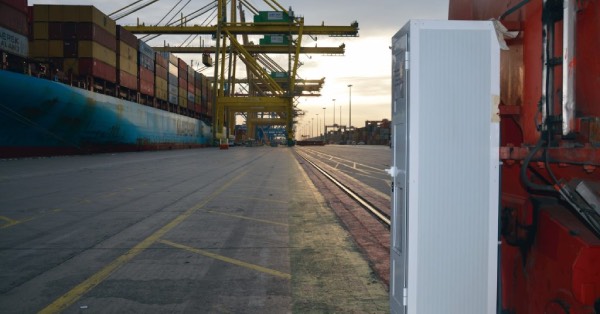The installation of dispensers on each of its STS cranes will enable the elimination of some 800,000 bottles consumed annually on the Valencian docks
The three container terminals of the Port of Valencia continue to make progress in the elimination of plastic in the process of supplying water to the port workers who work at these facilities every day. The placement of dispensers on each of their STS cranes will allow the elimination of some 800,000 bottles consumed annually in the Valencian docks.
Two years ago, Aportem-Puerto Solidario Valencia, Ecoport Valencia and the Valencia Port Employment Centre launched the “No Plàstic” campaign, a project with a very ambitious double objective: on the one hand, to change the paradigm in the use of plastic and replace it with recyclable materials; and, on the other hand, to raise awareness of the problems generated by the abusive use of plastic-derived materials.
The initiative received the support of the Valencia port community. Until the outbreak of the pandemic, companies responded with concrete actions, eliminating the use of plastic materials in their day-to-day business. Despite COVID-19, the logistics community remained committed. In recent months, the general trend has continued to be the total elimination of plastic in coffee and water machines, as well as the elimination of plastic bottles and their replacement by glass jugs and cups.
Within the framework of this project, the container terminals at the Valencian dock decided to take a more ambitious step, proposing the elimination of plastic in the process of supplying water to the dockers who work at their facilities every day. To achieve this goal, water had to be brought to the dockers’ workstations, and the most suitable solution was the installation of water dispensers in each of their STS cranes.
0 plastic, 100% supply
Last June, CSP Iberian Valencia Terminal launched a pilot project whose objective was the definitive and total elimination of the water bottles that were distributed every day among the hundreds of dockers working at the terminal. Since the beginning of October, the CSP Spain subsidiary no longer distributes one of these bottles, although it maintains 100% of the water supply for the workers.
The premises of this project are based on the guarantee of a hygienic water supply and the elimination of plastic. For this reason, CSP Iberian Valencia Terminal has invested in installing a dispenser in each crane, by means of a totally watertight and closed cabin that keeps the water in optimum conditions. This method solves the problem of bottled water consumption on the docks. To reinforce this objective, five more dispensers have been placed in the relay area, where dockworkers can refill their own bottle at any time.
In this sense, it is the first of the three container terminals that has taken the step, although both MSC Terminal Valencia and APM Terminals Valencia have already begun the steps to join the project and manage to remove from the Valencian dock around 800,000 plastic bottles that are consumed annually in the port area.
Proactivity of the stevedoring
In this sense, from the CSP Spain terminal, they value the role played by both the CPE Valencia and the ETT in the distribution of almost 3,000 reusable bottles for the dockers of the Valencian port. But, above all, they want to underline the predisposition and proactivity of the professionals in the stevedoring sector, whose role has been key, “as from the very beginning they have shown themselves to be aware and collaborative, and have contributed their ideas to further improve this new initiative”.
Terminals and users are convinced of the benefits of this project, due to its simplicity and improved water supply conditions. In fact, “it has aroused the interest of large ports in our area, which have the same problem with plastic and have asked for information”.









































